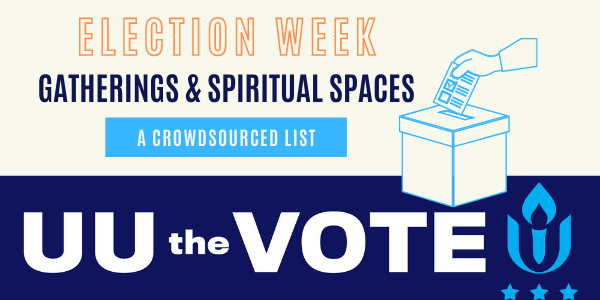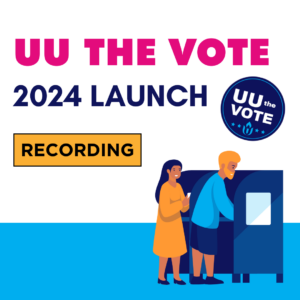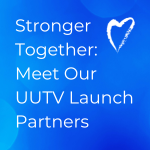It is a time of uprising. It is a time of equal parts inspiration and desperation, of hope and pain. The current events did not manifest themselves out of nowhere. They are a result of centuries of oppression — and centuries of resistance. May we look to the past to find the strength to create a more just future. May we look to the UU’s who respond to our faith’s call for justice with rigor to find the inspiration to do so ourselves.
Arizona is known as a state with one of the most abusive and violent police forces. Police brutality and the institutions that uphold it make daily life dangerous, disproportionately so for people of color. In late February, Phoenix went from being one of the largest cities without civilian oversight to a city with one of the most progressive models — the first step in seeking justice and accountability for the police force. This is largely thanks to the Phoenix Civilian Oversight Coalition, a partnership of frontline community organizations. Janine Gelsinger, executive director of Unitarian Universalist Justice Arizona, talks about how the organization fought alongside its community and the coalition to bring about this success.
Content Warning: This article mentions police brutality.
In the middle of June, 2019, the Phoenix police released a video of another violent abuse of power from their department. On television screens and on computer screens, on Youtube and in the news, people watched an all-too-familiar scene as police confronted Iesha Harper, 24, and her fiancee Dravon Ames, 22. The officers brandished their guns, pointing them at the faces of the family. An officer pointed his gun at Harper as she, pregnant and carrying her infant and her daughter, 4, left the backseat of their car. In the video, the viewer can hear the officers yell, “You’re going to get f–king shot!” and “I’m going to put a cap in your ass”.
What was the incident about? A 9-1-1 call where Ames and Harper’s four-year-old walked out of a Family Dollar with a doll. In Gelsinger’s words, “the city was at a boiling point”.
The leaders of justice organizations in Arizona were already in conversation spurred by the incredible tension at the time. This was when outcry over President Trump’s family separation policies were in full force — policies that hit very close to home near America’s southern border, where they were being implemented for about two years already. These leaders formed a conglomerate of ten community-based justice organizations; the Phoenix Civilian Oversight Coalition was born.
Now powerhouse groups like Poder in Action, Black Lives Matter Phoenix Metro, Puente Human Rights Movement, and the Black Phoenix Organizing Collective among others could synchronize their efforts to achieve an intermediate goal: creating an independent investigative body led by civilians to ensure police are held accountable for their misconduct and their crimes. UUJAZ was invited to support these organizations in their fight. They are the only faith-based organization in the coalition.
UUJAZ is a State Action Network, one of a body of 22 similar organizations across the United States. State Action Networks (almost exclusively referred to by their acronym, SANs) are Unitarian Universalist, justice based organizations. They are typically small — staffing can be as limited as one to three people — but they play a crucial role in coordinating and organizing congregations across the state. One of their most important tasks is to partner with organizations led by frontline communities.
“We talked openly about that in the coalition — where is our place?” Gelsinger said. “We wanted to make sure we understood where our role was and how we could help.”
The coalition knew that they had their work cut out for them. Tucked in the desert of Arizona, Phoenix is America’s 5th largest city. But it has been number one in a different category: police killings.
Phoenix is America’s 5th largest city. But it has been number one in a different category: police killings.
A New York Times article in December of 2018 reported that Phoenix police killed 41 people that year, over 25% more than Philadelphia, San Antonio, and San Diego — cities of similar sizes — combined. That tally increased to 44 by the end of the month. Phoenix police kill the most citizens per 1 million people in large cities: more than ten times the amount than New York City and more than double than the next city on the list, San Antonio. Phoenix police are three times more likely to kill black people than white people.
“I mean, our police department is out of control,” Gelsinger said. “Clearly, we’ve all seen the news, we’re not the only one. But it is really, really bad.”
The Phoenix Civilian Oversight Coalition officially formed in November of 2019. On February 25th of this year, the Phoenix City Council voted 5-4 to create the Office of Accountability and Transparency and a civilian review board. By any measure of organizing the coalition’s success was incredibly fast, a high-speed roller coaster. But it was enabled by years of groundwork.
“It was both,” Gelsinger said. “It was ten years of organizing leading up to this and this five month window where we said, ‘okay, let’s get this done’. Being in a historically red state, it’s tougher. Sometimes it takes so long. [Some states] have friendly representatives and their electives are people who represent them and their values and that’s great — but it’s not the environment that we have here. We have to fight.”
And the coalition did fight. In February, the stage was set. Council Member Carlos Garcia had proposed his plan for civilian oversight, supported by the Civilian Oversight Coalition. Mayor Kate Gallego had given hers, a moderate plan of compromise with the police department. The floor was open for comments.
Someone in a T-shirt reading “Cops Must Be Accountable To The People” took the stand, testifying about their experience with the abusive police force. Then another person testified. Then another. For four hours people wearing shirts bearing the same message recounted their experiences, urging the City Council members to adopt Garcia’s plan. For four hours citizens organized by the coalition made their voices heard: accountability or nothing. “I spoke, UU ministers spoke, the whole coalition [spoke],” Gelsinger remembered. “We had over 200 people show up to the city council meeting.”
The proposal passed; still the effort was not over. It would then have to pass through the budget, where it could get sidelined with not enough funding. Citing budget cuts due to loss of revenue from COVID-19, the civilian review board was slated to receive just $400,00 of the $2.5 million necessary. The police, on the other hand, were watching their budget increase by $25 million this year and over $200 million since 2010, with their proposed $745 million this year.
The coalition continued to demand justice, seeking less funds for the police and more for oversight and community investment. In a digital City Council meeting in late May, 25 UU’s flanked the community groups with comments in support, insisting that the proposal pass with enough funding. They were 10% of the comments in the whole meeting.
When Wednesday June 3rd came, over 600 people stood in 110 degree heat at the City Council’s budget meeting as part of the national wave of protests. The meeting was six hours long; there were hours of public testimony to ask for less police funding. The vote was rescheduled to the next Monday.
Finally on June 8th, on another scorching day and with the budget on the line, residents demanded yet again that the funding for oversight go through. The vote passed. The coalition could claim a success at last on their path to divesting from policing and reinvesting in community. “Today city council voted 7-2 for a budget that fully funded the Office of Accountability and Transparency, that did not cut community programming or city staff increases, and instead took money from the jail contract,” Gelsinger stated in a Facebook post. But she knows that this is but the first step. “The police get to keep their $25 million dollar raises. Again, for the deadliest police department in the country, and in this moment, that’s not right.”
“The police get to keep their $25 million dollar raises. Again, for the deadliest police department in the country, and in this moment, that’s not right.”
The organizations that made up this coalition are not going away. The full list of the Phoenix Civilian Oversight Coalition is below; they are powerful examples of community organizing with the goal of removing injustice.
You can join these incredible organizations and UUJAZ in fighting for the values that affirm our faith. Find a State Action Network near you, or organize your congregation to take action for justice. If you are interested in volunteering with UU the Vote, sign up here. And if you are interested in reading more articles like this, visit our website here.
If you would like to hear from the source about building UU partnerships with frontline orgs, tune in to UU the Vote on the first day of GA, where Gelsinger and Isis Gil of Puente Human Rights Movement are leading a discussion.
Written by Aidan Wertz, UU the Vote blogger
Phoenix Civilian Oversight Coalition member organizations:
Equality Arizona, UUJAZ, Poder in Action, Puente Human Rights Movement, Black Lives Matter Phoenix Metro, Black Phoenix Organizing Collective, Phoenix Local Organizing Committee, Fund for Empowerment, Mass Liberation Arizona, White People Against White Supremacy





